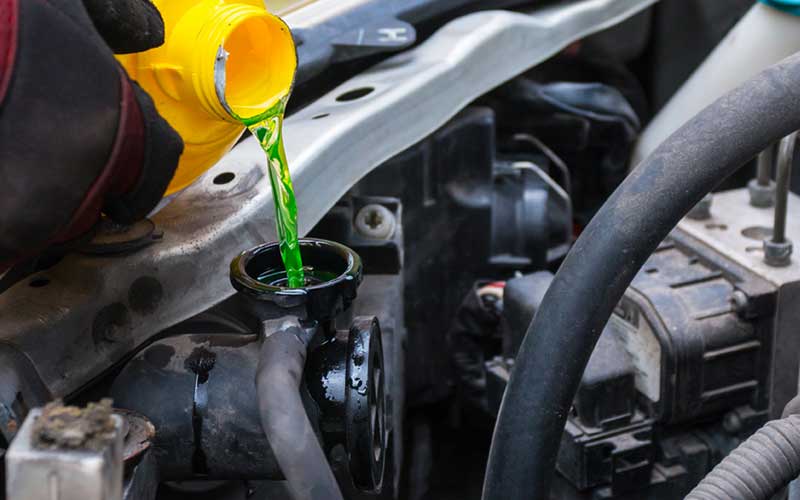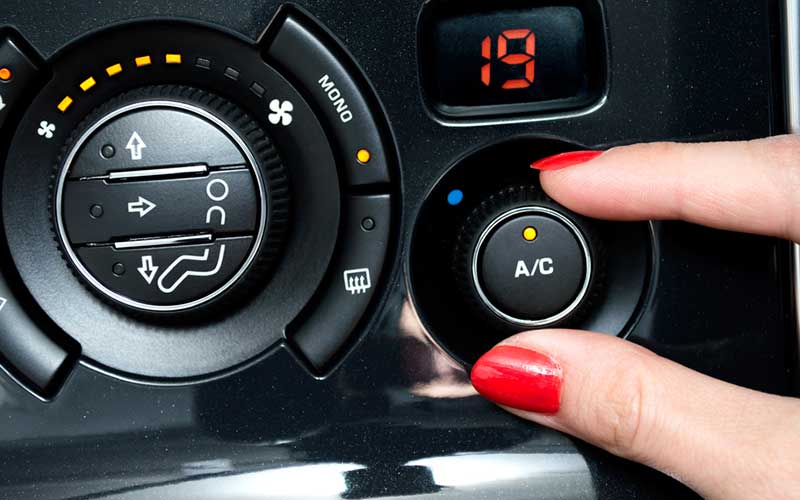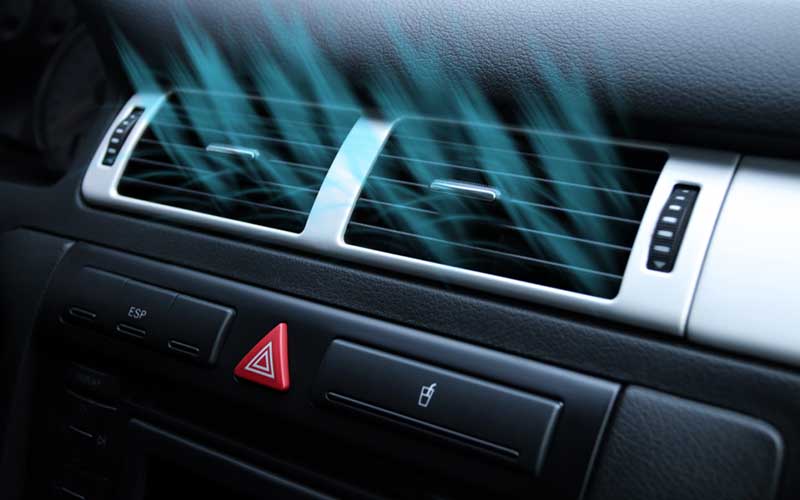It can be annoying and easily depressing if your AC breaks down on a warm or hot day. You would want certain questions answered such as does coolant affect AC? What other factors can improve my car’s AC?
After reading this piece, you should be aware of possible reasons why your AC is performing poorly, so you are in the right place.
As a heat transmission fluid, coolant serves as a component of the AC system. It’s a fluid that runs throughout the cylinders of your car’s engine to cool them and keep them from overheating.
To protect your car’s interior, the coolant takes in heat from the inside and disperses it. It alters when the AC is operating or when/if it feels warmer or hotter outside.
Your AC will operate less effectively if you clean the coolant. This means that your AC will require coolant to keep your car cold. Also, a cool car is important for the driver’s and passengers’ comfort.
This article will address the popular question of whether engine coolant impacts the efficiency of the air conditioner and, the true nature of coolant & all the advantages it offers your car.
Does Coolant Affect the Air Conditioning?
The direct answer is yes. Coolant can affect air conditioning performance in quite some ways. Basically, coolant can affect your AC’s airflow, humidity, and temperature. The proximity of your car’s interior to your engine may also affect your AC.
The performance or operation of your AC is indirectly impacted by the engine cooling system. Having a poor AC output can result from having a high engine performance.
The capacity of the air conditioner to adequately cool the vehicle must not be hampered by the temperature of the engine coolant, but a high or elevated coolant temperature can cause problems with the air conditioner. 1 or 2 faults with your system can result from poor airflow between the radiator and condenser.
Also Read: Car Air Conditioner Blowing Hot Air (Causes & Fix)
How Does Coolant Affect AC?

The two systems, A and B, are different from each other. A transparent liquid is known as coolant or antifreeze. There are numerous hues available. You can find these in your home’s radiator.
It will help keep your engine and radiator cool during the sweltering summer. In the winter, it won’t freeze as a result of it.
Freon is used as a refrigerant by the air conditioning system to make the inside of your automobile cool. The contrary is true: a coolant cleansing won’t make your AC stay silent.
How Does an Engine Coolant Work?
What’s an engine antifreeze or coolant & what is its function?
As was already said, the fluid that travels through the engine of your car is known as a coolant, sometimes known as antifreeze. Its goal is to keep your engine’s temperature stable and keep it from overheating, as you are already aware.
A continual cycle of coolant must circulate inside the motor or engine for it to function. If you didn’t know, your car’s engine’s exterior shell, also known as the Water Jacket, is one of its most crucial parts.
To keep the temperature stable and avoid overheating, coolant or antifreeze flows through the jackets into the motor/engine. However, the antifreeze doesn’t stop there. It continues to flow through hoses to the radiator, where it cools down eventually.
What Is Car Air Conditioning (AC)?
A car’s interior can be kept cool with the aid of an AC system. Its three essential parts are the compressor, condenser, and evaporator.
Additionally, your air conditioning system requires a coolant called refrigerant to efficiently chill the inside of your vehicle. In automobiles, R-134a Freon is the most widely used refrigerant.
To cool the interior of your automobile, the three main parts of the air conditioning system cooperate to transport Freon through a closed-loop system of low and high pressure.
How Does Engine Coolant Affect Air Conditioning?
You may have a clue if you discover that the AC’s Auto mode is unable to detect the cabin temperature. When you switch off the heater in the winter and just receive cool air blown out, that is another sign.
Because there is not enough coolant or antifreeze to circulate & disperse heat, this is the cause.
There are several ways that coolant might affect an automobile’s air conditioning system.
Airflow
Since coolant regulates the manner in which cool air enters the machine; airflow may be impacted. There won’t be enough antifreeze in the automobile, which will cause a lot of hot air to flow inside, raising the temperature & humidity levels. Passengers who can suffer from heat stroke or extreme dryness may feel uncomfortable if there is no breeze.
Humidity
Similar to how a house air conditioner can assist in preserving the appropriate quantity of air moisture for the satisfaction and comfort of its occupants.
The same logic applies to the humidity level in a car; if it’s too low, the AC will leave the driver & passengers with dry mouths and skin. The engine block needs to contain enough moisture for the antifreeze to be able to return the humidity to the atmosphere.
Temperature
Since, it’s situated close to the cylinder block or engine block, coolant has the ability to freely heat a car’s interior. Because the antifreeze quickly cools where it’s most required while also discharging hot air from behind, this prevents the engine from overheating.
However, if you’re experiencing problems with the air conditioning in your car, it might not constantly be your antifreeze levels that are at blame.
You might be asking why your air conditioner is performing poorly if your antifreeze levels are normal. Here are a few additional explanations for why your AC will not be functioning as well as you had intended.
Another potential culprit, in this case, is your thermostat. If your automobile has once been owned by someone else, you might want to investigate any thermostat modifications that may have been made in the past and make sure that it is installed properly and operating as it is supposed to. When it comes to fully opening and closing, it can also be stuck or inoperable.
The temperature of your car’s engine may drop if your thermostat is stuck open, causing a loss of warmth in your system & possibly the dreaded Check Engine light.
Another possibility is that if your thermostat is stuck closed, not enough coolant will be reaching your engine while it is running, which could result in catastrophic overheating.
You have to also check for bad radiator installation and leaks since these factors may be to blame for your car’s ineffective air conditioning.
The water pump, which pumps your antifreeze and ensures correct water circulation, is one more important part to check. Using centrifugal force & impeller blades, the pump moves antifreeze around the motor or engine and through the pipes that enter the radiator.
As soon as the engine has reached operating temperature, you can quickly test the coolant circulation by touching the lower radiator hose.
If the lower hose feels warm, coolant circulation is evident. The effectiveness of your air conditioner would be impacted if it didn’t feel warm, which could indicate that your car’s radiator is obstructed.
Also Read: Car Overheats When AC Is On (Causes & Fix)
Can Low Coolant Affect Car AC?
Low antifreeze or coolant may affect how well your car’s air conditioning system operates. Consequently, the coolant will ensure that your radiator & other internal A/C components continue to operate as intended.
Insufficient fluid in the system will cause your car or truck to overheat and possibly fail to maintain the proper engine antifreeze or coolant temperature. Driving for a long time with low coolant could cause your radiator to burn up.
It’s common for individuals to add a little more antifreeze when they fill up on gas. However, if you discover that your vehicle is warming up faster than usual or that your engine cooling fan is coming on more often, there should be several underlying problems.
If you continue to drive with low fluid levels, the radiator system could sustain long-term harm.
Nevertheless, a faulty antifreeze level sensor may cause an air conditioner problem to appear immediately. Check your reservoir & fill it as necessary to avoid this from happening
How Do You Know If Your Car AC Needs Coolant?
Your car’s air conditioning might not function as well if the cooling system is filled with little or no coolant. Based on the findings of a diagnostic test, your AC will require a new radiator cap or additional fluid.
When your car’s A/C unit fails to keep the interior cool after starting the car, you should add more fluid and have the system checked.
If the critical coolant in your car’s air conditioning leaks away too quickly, your overall performance can suffer. Because of this, your reservoir can get filled up with water, which might cause your cooling system’s radiator & other components to rust.
It’s time to change your coolant if you discover rust around the reservoir.
You can also consider adding or determining why the corrosion in your car’s radiator has accumulated so quickly. After shutting off the engine, remove the radiator cap to check for any leaks that might be causing quick erosion.
A coolant leak may be indicated by the presence of puddles under your vehicle.
If the performance of the air conditioning system in your automobile suddenly drops, it may also not be cooling properly. Wires and other engine compartment components may show symptoms of rusting or corrosion, which could be a sign of an antifreeze leak.
Coolant evaporation can be detected by smoke, sparks, or fluid pouring from your car’s radiator.
By causing your cooling system’s components to corrode, mixing water and coolant can make the problem even more difficult. Use an authorized container when adding antifreeze to your radiator to avoid combining coolant with water and risking acid spraying out of your motor/engine.
How Often Should You Change the Coolant?
It is time to change the antifreeze if you notice any irregularities with your air conditioner or heater. However, it’s advised to inspect the coolant level every two weeks or before a long trip if you believe the coolant needs to be replaced.
Unless it deteriorates because of mineral deposits, low concentration, or corrosion, the coolant typically does not need to be changed. Using a syringe to extract a small part of the radiator reservoir and contrast it with the original hue will allow you to visually assess the coolant’s quality.

Does Coolant Affect a Car’s Heater?
Heat is transferred through the coolant. Therefore, the heater won’t be capable of blowing hot air if your vehicle isn’t outfitted with enough coolant.
Your engine’s heat is transferred to the radiator by coolants. This liquid can diffuse heat from the outside in the summer, but it can also be utilized in the winter to warm the cabinet.
Also Read: How to Bleed off an Overcharged AC (Expert Guide)
Frequently Asked Questions – Does Coolant Affect AC?
Is car AC related to coolant?
Coolant/antifreeze is used by your engine’s cooling system to keep your engine cool even on the warmest days. The air conditioning system in your car functions as a separate cooling system. It employs refrigerant, often known as Freon, to keep you & your family cozy and cool.
How much should a coolant change cost?
For a typical coolant change, you may anticipate spending between $100 & $200.
Does coolant affect AC and heat?
Usually, antifreeze can impact the airflow, humidity, and temperature of your air conditioner. The temperature of your AC may be impacted by how close your engine is to the interior of your automobile. As a result, your antifreeze is effectively removing heat from your motor/engine, but it’s possible that mistakenly it’s also heating the air conditioning.
Can low coolant cause AC to stop working?
Your car’s air conditioning system’s operation may be impacted by low coolant. As a result, your radiator & other internal A/C components will continue to function properly thanks to the coolant. It will overheat & maybe fail to maintain the appropriate engine coolant temperature in your automobile or truck if there isn’t enough fluid in the system.
Can I use water instead of coolant?
Because water’s boiling and freezing points are not as wide as those of antifreeze and because it cannot shield the engine of your car, water cannot replace antifreeze on its own. Aside from that, it does not take in heat as well. You may use water in your antifreeze rank in the event of a true emergency.
How often should the coolant be changed?
How Frequently should the coolant be flushed? The typical interval between flushes for silicated coolants is thirty miles or two years, and for extended drain coolants, it can be up to 5 years or one hundred thousand miles, depending on the vehicle and the antifreeze.
Can I top up the coolant with tap water?
If your antifreeze level is too low (close to or below the lower mark), you can top it off by adding pre-mixed antifreeze directly to the reservoir or topping it off with a 50/50 solution of water & antifreeze (for typical driving conditions). In an emergency, you can utilize clear tap water, but you should add antifreeze right away.
Can you just drain and refill the coolant?
“Drain & fill” is another name for the conventional coolant draining procedure. This simply entails draining the antifreeze from the radiator’s bottom then topping it off with new fluid until the radiator is full or filled up.
Is it OK to add new coolant without draining the old?
You don’t have to flush out the previous or old coolant before adding the new one. The older/former coolant, however, turns corrosive over time. Corrosion may result from this, and further cooling system flaws may result. Generally speaking, manufacturers advise replacing the coolant every thirty thousand miles.
Conclusion – Does Coolant Affect AC?
To accurately diagnose your problems and quickly get your automobile back on the road in full working condition, it is important to understand the proper functions of your car.
When it comes to ensuring that your car’s engine remains in good working order, the coolant is just as important as the gas you put in it.
Always consult a trained professional or your neighborhood garage to inspect the vehicle and provide a detailed diagnostic of the issues at fault if you are ever uncertain of where the problem is coming from.

